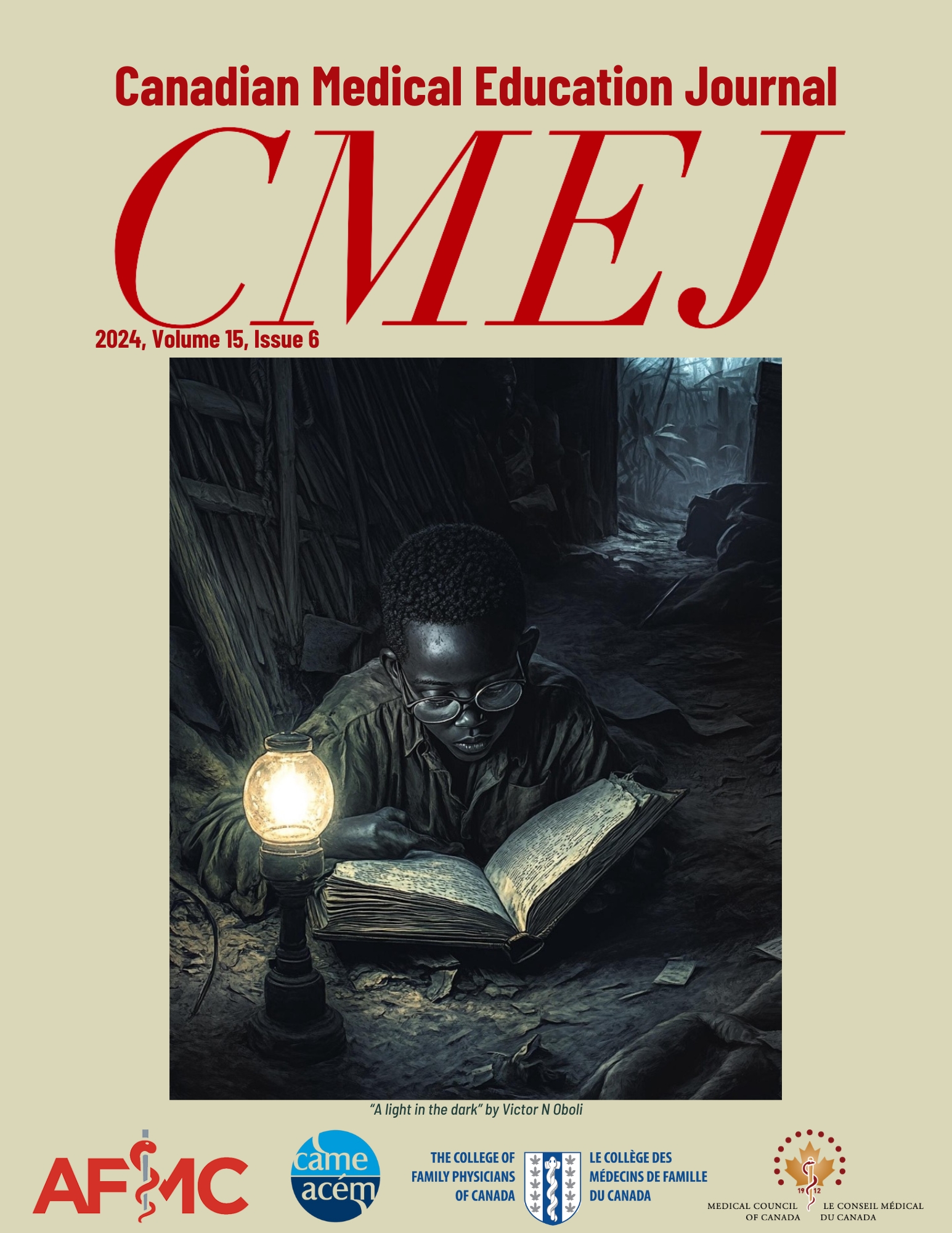Perception des retombées d’une activité de formation des étudiants en médecine au sein d’organismes communautaires
DOI :
https://doi.org/10.36834/cmej.76842Résumé
Contexte : Les activités d’apprentissage par le service dans la communauté (ASC) sont intégrées au sein des facultés de médecine depuis plusieurs années. Toutefois, peu de données existent permettant de comprendre les retombées de ce type d’activités sur les personnes étudiantes et les milieux communautaires. Cette recherche visait à explorer les perceptions des retombées d’une activité de formation ASC offerte aux personnes étudiantes en médecine.
Méthodes : Une étude qualitative descriptive interprétative a été menée. Elle incluait des entrevues semi-dirigées pré et post stage, menée auprès des personnes étudiantes ayant participé aux activités d’ASC (pré n=21, post n=7), de même que des groupes de discussion focalisée auprès d’intervenants ou responsables d’organismes communautaires (n=17).
Résultats : Les expériences vécues au sein de milieux socioéconomiques et culturels pluriels ont contribué à améliorer la compréhension par les personnes étudiantes du concept de vulnérabilité sociale et du vécu des personnes vivant en contexte de vulnérabilité. L’ASC a également généré une meilleure perception de la compréhension de l’importance des organismes communautaires dans l’aide à ces personnes en situation de vulnérabilité.
Conclusion : Dans le cadre de l’ASC, une meilleure compréhension des facteurs contribuant au développement de compétences touchant la pratique en contexte de vulnérabilité s’avère nécessaire pour permettre une expérience significative et souvent transformative chez les futurs médecins.
Références
Smith L, Martin H, Hardison L, Bird J, others. Seifer SD and Connors K., Eds. Community campus partnerships for health. faculty toolkit for service-learning in higher education. Scotts Valley, CA: National Service-Learning Clearinghouse, 2007. 2007; Disponible à: https://pdfs.semanticscholar.org/44c1/f151ad466b3fe8609394cc77d6dc0a7c2126.pdf
George-Paschal L, Hawkins A, Graybeal L. Investigating the overlapping experiences and impacts of service-learning: juxtaposing perspectives of students, faculty, and community partners. Mich J Comm Serv Learn. 2019;25(2):43-61. https://doi.org/10.3998/mjcsloa.3239521.0025.203 DOI: https://doi.org/10.3998/mjcsloa.3239521.0025.203
Hasbún B, Miño C, Cárdenas C, Cisternas O, Fara C, Garcia F. Service-learning as a means to promote development of social responsibility competency in a department of economics and business (English translation). Intern J Res Serv-Learn Comm Engag. 2016 Dec 22;4(1). https://doi.org/10.37333/001c.29618 DOI: https://doi.org/10.37333/001c.29618
Mihan A, Muldoon L, Leider H et al. (2022). Social accountability in undergraduate medical education: a narrative review. Educfor Health. 2022;35(1), 3-8. https://doi.org/10.4103/efh.efh_305_21 DOI: https://doi.org/10.4103/efh.efh_305_21
Truong J, Sandhu P, Sheng V. et al. Advocacy in community-based service learning: perspectives of community partner organizations. Can Med Educ J. 2023;14(1), 90-94. https://doi.org/10.36834/cmej.74887 DOI: https://doi.org/10.36834/cmej.74887
Dankner R, Gabbay U, Leibovici L, Sadeh M, Sadetzki S. Implementation of a competency-based medical education approach in public health and epidemiology training of medical students. Isr J Health Policy Res. 2018 Feb 20;7(1):13. https://doi.org/10.1186/s13584-017-0194-8 DOI: https://doi.org/10.1186/s13584-017-0194-8
Bandura A. Social foundations of thought and action: a social cognitive theory. Englewood Cliffs, NJ, US: Prentice-Hall, Inc; 1986. xiii, 617 p. (Social foundations of thought and action: A social cognitive theory).
Van Melle E, Gruppen L, Holmboe ES, et al. Using contribution analysis to evaluate competency-based medical education programs: it's all about rigor in thinking. Acad Med. 2017 Jun;92(6):752-8. https://doi.org/10.1097/ACM.0000000000001479 DOI: https://doi.org/10.1097/ACM.0000000000001479
Graham ID, Logan J, Harrison MB, et al. Lost in knowledge translation : time for a map ? J Cont Educ Health Profess. 2006;26(1), 13-24. https://doi.org/10.1002/chp.47 DOI: https://doi.org/10.1002/chp.47
Goldstein AO, Bearman RS. Community engagement in US and Canadian medical schools. Advance Med Educ Pract. 2011;43-49. https://doi.org/10.2147/AMEP.S16823 DOI: https://doi.org/10.2147/AMEP.S16823
Westerhaus M, Finnegan A, Haidar M, Kleinman A, Mukherjee J, Farmer P. The necessity of social medicine in medical education. Acad Med. 2015 May;90(5):565-8. https://doi.org/10.1097/ACM.0000000000000571 DOI: https://doi.org/10.1097/ACM.0000000000000571
Faulkner LR, McCurdy RL. Teaching medical students social responsibility: the right thing to do. Acad Med. 2000 Apr;75(4):346-50. https://doi.org/10.1097/00001888-200004000-00010 DOI: https://doi.org/10.1097/00001888-200004000-00010
Francis CK. Medical ethos and social responsibility in clinical medicine. J Urban Health. 2001 Mar;78(1):29-45. https://doi.org/10.1093/jurban/78.1.29 DOI: https://doi.org/10.1093/jurban/78.1.29
Boyatzis R, Kolb D. From learning styles to learning skills: The executive skills profile. J Managerial Psychol. 1995 Aug 1;10:3-17. https://doi.org/10.1108/02683949510085938 DOI: https://doi.org/10.1108/02683949510085938
Godkin M, Savageau J. The effect of medical students' international experiences on attitudes toward serving underserved multicultural populations. Fam Med. 2003 Apr;35(4):273-8. PMID: 12729313
Brown JM, Patel M, Howard J, Cherry G, Shaw NJ. Changing clinical practice: significant events that influence trainees' learning. Educ Prim Care. 2011 Jan;22(1):25-31. https://doi.org/10.1080/14739879.2011.11493958 DOI: https://doi.org/10.1080/14739879.2011.11493958
MacLeod A. Caring, competence and professional identities in medical education. Adv Health Sci Educ Theory Pract. 2011 Aug;16(3):375-94. https://doi.org/10.1007/s10459-010-9269-9 DOI: https://doi.org/10.1007/s10459-010-9269-9
Loignon C, Haggerty JL, Fortin M, Bedos CP, Allen D, Barbeau D. Physicians' social competence in the provision of care to persons living in poverty: research protocol. BMC Health Serv Res. 2010 Mar 25;10(1):79. https://doi.org/10.1186/1472-6963-10-79 DOI: https://doi.org/10.1186/1472-6963-10-79
Betancourt JR, Green AR, Carrillo JE, Ananeh-Firempong O. Defining cultural competence: a practical framework for addressing racial/ethnic disparities in health and health care. Public health reports. 2003;118(4):293-302. https://doi.org/10.1093/phr/118.4.293 DOI: https://doi.org/10.1016/S0033-3549(04)50253-4
Miles MB, Huberman AM. Qualitative data analysis: an expanded sourcebook. SAGE; 1994. 358 p.
Téléchargements
Publié
Numéro
Rubrique
Licence
© Thomas Gottin, Veronique Foley, Geneviève Petit, Carol Valois, Christine Loignon 2023

Cette œuvre est sous licence Creative Commons Attribution - Pas d'Utilisation Commerciale - Pas de Modification 4.0 International.
La soumission d’un manuscrit original à la revue constitue une indication qu’il s’agit d’un travail original, qu’il n’a jamais été publié et qu’il n’est pas envisagé pour publication dans une autre revue. S’il est accepté, il sera publié en ligne et ne pourra l’être ailleurs sous la même forme, à des fins commerciales, dans quelque langue que ce soit, sans l’accord de l’éditeur.
La publication d’une recherche scientifique a pour but la diffusion de connaissances et, sous un régime sans but lucratif, ne profite financièrement ni à l’éditeur ni à l’auteur.
Les auteurs qui publient dans la Revue canadienne d’éducation médicale acceptent de publier leurs articles sous la licence Creative Commons Paternité - Pas d’utilisation commerciale, Pas de modification 4.0 Canada. Cette licence permet à quiconque de télécharger et de partager l’article à des fins non commerciales, à condition d’en attribuer le crédit aux auteurs. Pour plus de détails sur les droits que les auteurs accordent aux utilisateurs de leur travail, veuillez consulter le résumé de la licence et la licence complète.











